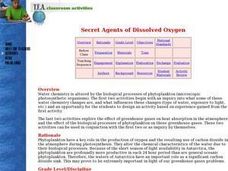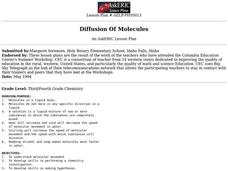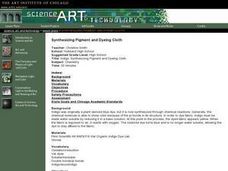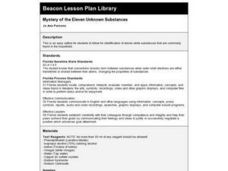Curated OER
Secret Agents of Dissolved Oxygen
Students determine the changes in different types of water in a sealed container over time. They investigate how to measure dissolved oxygen, temperature, and carbon dioxide with calculator or computer probe-ware. Students determine the...
Curated OER
Diffusion Of Molecules
Students investigate molecular movement while studying how to perform a chemistry investigation.
Curated OER
Specific Heat Capacity of a Metal
Eleventh graders investigate the relationship between heat and energy transfer. They review terms including heat, work, calorimetry and the procedures for an experiment. After assembling the materials for the experiment, they observe...
Curated OER
The Same But Different
Third graders observe a frozen container filled with ice and discuss what happens when the ice sits out in the room. They practice measuring the mass and volume of the ice, watch as the frozen container is placed in a warm water bath to...
Curated OER
Ocean Absorption Lab
Students examine various techniques that can reduce carbon dioxide in the atmosphere, and use chemistry to simulate oceanic sequestration. They conduct an experiment involving the method of oceanic absorption for carbon sequestration,...
Curated OER
Stream Flow in Blacks Creek
Students explore what factors affect the stream flow in a local body of water. They collect data to measure stream flow and discharge and construct a hypothesis concerning the factors affecting stream flow.
Curated OER
Life in Extreme Environments - Lakes Under Ice
High schoolers collect chemical, physical, and biological data from a local lake throughout the year. In addition, students discuss the design of an experimental structure for water collection at several specific depths as well as assess...
Curated OER
Is it Alive?
Students watch a demonstration using Duco glue and water and try to determine if the "monster" shown is alive. After the demonstration, they discuss what characteristics make an organism "alive". They participate in a card sorting...
Curated OER
Build Your Own Weather Station
Studens experiment with temperatures. In this science lesson, pupils make their own weather station by heating one bottle and keeping the water in another bottle at room temperature.
Curated OER
Geo Sequestration Lab
High schoolers explore geologic sequestration as a technique used to reduce carbon dioxide in the atmosphere. They use chemistry to stimulate oil mining. Students conduct an experiment to learn about geo carbon sequestration.
Curated OER
Science and Technology
Eighth graders explore the roles of science and technology in today's world. They research a topic based on the uses of science in society. Students discuss medicine, power, transportation, water and sewage treatment and stereos, TVs....
Curated OER
Chemical Reactions
Students work in groups to define chemistry vocabulary including the terms reactants, products, exothermic and endothermic. They then combine the group definitions to arrive at a consensus definition for the class. Students also listen...
Virginia Department of Education
Acids and Bases
What did one titration say to the other titration? We should meet at the end point! Young chemists perform four experiments: dilute solution, neutralization, titration, and figuring pH/pOH.
Virginia Department of Education
The Colligative Properties of Solutions
How can you relate colligative properties of solutions to everyday situations? Pupils first discuss the concepts of density, boiling and freezing points, then demonstrate how to accurately determine the boiling and freezing point of...
Curated OER
Conversion Factors
In this conversion factors worksheet, students convert 15 measurements from one unit in the SI system of measurement to another unit. Students show their work and indicate the unit of measurement. Conversion factors are given.
Virginia Department of Education
Aspirin Analysis
Laughter may be the best medicine, but aspirin is also important. Young chemists analyze aspirin tablets using titration in this lab experiment. They then repeat the entire experiment using a different aspirin brand.
Virginia Department of Education
Soap, Slime, and Creative Chromatography
Do you think chromatography paper suffers from separation anxiety? Young chemists make soap, slime, silly putty, and experiment with chromatography in this instructional activity. The material includes clear instructions for each...
Virginia Department of Education
Heat Transfer and Heat Capacity
It's time to increase the heat! Young chemists demonstrate heat transfer and heat capacity in an activity-packed lab, showing the transitions between solid, liquid, and gaseous phases of materials. Individuals plot data as the changes...
Curated OER
Microscopes and Crystals
Students observe crystals under the microscope. In this science lesson, students compare how the crystal look like using their eyes, hand lens and microscope. They identify the type of crystal based on the amount of light they allow to...
Curated OER
Sink or Swim
Students define density and explain how to determine the density of an object. Students participate in a demonstration that shows the differences in the densities of different liquids and how they affect the liquid's physical properties.
Curated OER
Lotic Environment
Students assemble a classroom river model as an example of a lotic system. They control and measure biotic and abiotic information for the in-class system and compare data with a lotic system in a natural environment.
Curated OER
Synthesizing Pigment and Dyeing Cloth
Students create a synthetic dye and oxidize the dye and record the effects.
Curated OER
What Is In The Cup?
Students investigate the mixtures of solutions. They utilize cups filled with bases and acids. Students test and determine the pH of each cup. The multiple cups are compared to each other in order to chart acids and bases according to pH...
Curated OER
Mystery of the Eleven Unknown Substances
Fourth graders identify eleven white substances that are commonly found in the household. They, in pairs, perform experiments on a variety of substances, and must identify them based on the reactions they observe.
Other popular searches
- Water Chemistry
- Lake Water Chemistry
- Water Chemistry Ions
- Co2 Water Chemistry
- Water Chemistry Lesson Plans
- Ocean Water Chemistry
- Basic Water Chemistry
- Water Chemistry Properties
- Storm Water Chemistry
- Marine Water Chemistry
- Size vs. Water Chemistry
- Water Chemistry Nitrate

























